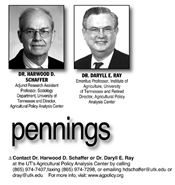The Worldwide Pandemic May Put An Unforeseen Damper On Crop Prices

Agricultural commodities are riding a wave of high prices which is good news for farmers in the short run. As our regular readers know, we have pointed out that high agricultural commodity prices generally result from short-term shifts in either supply (a decrease) or demand (an increase). The resulting high prices trigger an exaggerated increase in production and often by the time the crop is harvested, the crunch has passed and prices plummet.
Since the start of the current wave of high agricultural prices we have worried that this historical pattern will repeat itself and farmers will once again find themselves in financial distress.
What we did not anticipate was a new problem on the horizon that could have a devastating impact on the price of storable agricultural commodities. The problem: getting the product from here to there. Let us explain.
With a recovery from the coronavirus pandemic on the horizon, companies are going all in to make sure that they have their products on the shelves when the anticipated recovery arrives. They do not want to be caught short waiting for products to arrive.
As a result, we are seeing a significant tightening of international supply chains. Some products and product components are in short supply. In addition, the surge in demand for a wide range of products and product components requires ships to move the products from producers to consumers, say from China to the US or the EU.
But the problem is not just an issue of the absolute number of ships available; it is also an issue of the spread of the coronavirus among seafarers on those ships. In addition, ships that have visited countries with high coronavirus infections are not permitted to dock in some ports. With coronavirus infections among crew members, there may not be enough people available to crew those ships, leaving them sit idle until a full crew can be found.
This is particularly challenging because the country with one of the highest rate of uncontrolled coronavirus spread, India, is the home country for some 12 percent of seafarers involved in international shipping.
So even if we had enough ships for the current crunch in demand, we would still have a problem getting enough healthy seafarers to crew the ships.
And therein is the immediate threat to high agricultural commodity prices. These high prices are the result of increased international demand for agricultural commodities. But, if we can’t get the corn, wheat, soybeans, rice, and cotton from here to there, prices could take a significant hit.
To be able to ensure that we don’t lose shipping capacity because of coronavirus infections, we need to make sure that we get a massive number of doses of vaccine to the coronavirus hotspots of the world as quickly as possible.
We would like to think that making the ethical argument for reducing COVID-19 deaths around the world would do the trick to get the US to lead and significantly fund a worldwide vaccination program, but the continued resistance to the science behind our strategy of managing the pandemic in the US leaves the two of us in doubt as to that approach.
So, let us turn instead to the self-interested economic argument. The quicker we get the pandemic under control worldwide, the quicker we can ensure that US crops will have access to the ships that are needed to get our corn, wheat, soybeans, rice, and cotton to our importing partners. It is as simple as that.
That won’t protect crop prices against long-term overproduction, but it will reduce the immediate threat.
The second economic reason to get the pandemic under control is to reduce the long-term risk of inflation; we know what uncontrolled inflation did to the bottom line of farmers in the 1970s. Given the rapid increase in demand for consumer products and their components by companies in anticipation of an increase in consumer demand, a short- term blip in inflation is probably inevitable.
HEABut the quicker we get the pandemic under control worldwide and supply and demand factors back in balance, the quicker we will see the cooling off of a temporarily overheated economy. A trillion dollars or so to finance a worldwide vaccination effort may be cheap compared to the alternative. ∆
DR. HARWOOD D. SCHAFFER: Adjunct Research Assistant Professor, Sociology Department, University of Tennessee and Director, Agricultural Policy Analysis Center
DR. DARYLL E. RAY: Emeritus Professor, Institute of Agriculture, University of Tennessee and Retired Director, Agricultural Policy Analysis Center